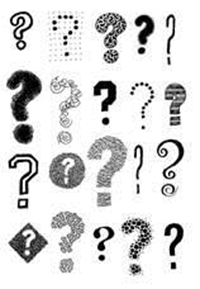6.1 Types of interview question
Did you notice anything about the way the questions were asked in the last activity? They were difficult to give a one word answer to, like yes or no. They require you to provide information. These are known as open questions and encourage replies incorporating both facts and attitudes or feelings.
There are other ways in which questions might be asked, and they expect different things of you. Below are the main types of questions you might encounter.
- Specific questions require you to give a factual response. They are often used when there is some technical content expected in the answer. For example, ‘What problems did you encounter in the early planning stage of the building extension?’.
- Hypothetical questions ask you to imagine a scenario and aim to assess the speed and quality of your thoughts. An example might be ‘What if the policy changed to carrying more freight by air?’. When replying, say what assumptions you are making, and indicate what other information you might need. For instance, you might ask ‘Would this just be in Myanmar or the whole of Asia?’. The interviewer will look for logical, clear thinking rather than a specific answer.
- Technical questions are those which test your knowledge. You might be asked about specialist concepts, terms and methods. They are often used in engineering, scientific and IT interviews.
- Closed questions require short, one- or two-word answers. They are often asked to establish facts or to clarify something you have said. For example, ‘Were you dismissed from your previous company?’ or ‘How many years did you work there?’. They are sometimes asked to refocus you when you have drifted off the point, so spot them, and give the one word answer needed.
- Competency-based questions ask you to give specific examples of skills, qualities and competencies needed in the job. They work on the principle that if you did something in the past, you can do it again. You will normally be asked to talk about a situation in which you have used that skill. Questions often begin ‘Can you tell us a time when…?’.
You encountered this kind of question in Week 2 when you learned how to use the STAR technique in answering questions on application forms. Now you have the chance to learn how to do it in an interview.
Now answer these two questions in your notebook. They are designed to test competencies which are likely to be needed in all jobs. Remember that you can draw on examples from any aspect of your life.
Tell me about a time when you had to manage competing demands on your time?
Competency you need to demonstrate: an ability to prioritise
Give me an example of a time you had to persuade someone to do something?
Competency you need to demonstrate: persuading others
Comment
Now read your answers out loud. Do they sound right and natural? If not, you might want to edit them or rehearse how you might say this differently in a real situation. In front of your mirror at home or on long dull journeys are good times for this kind of rehearsal.
If you have time in your study schedule, you may want to practice writing more competency-based answers. Choose competencies that your research has shown you are important in the kind of work you want to do. These will often be listed on job descriptions.
Of course, not all questions will be as straightforward as the ones you have practised, so the following section provides guidance on how to handle some of the tougher or trickier questions you may be asked.
6 Interview question practice

